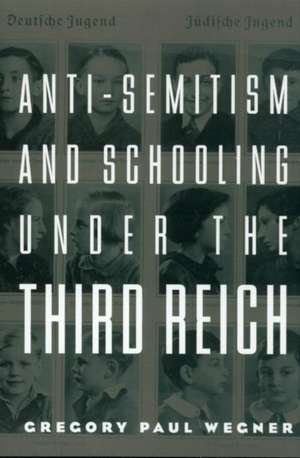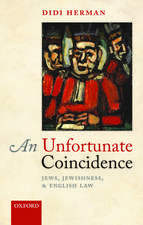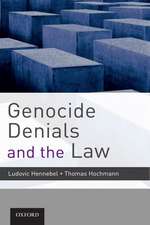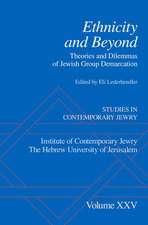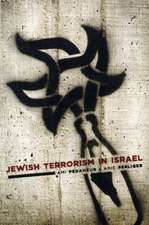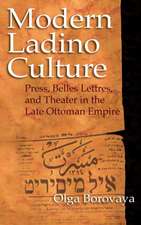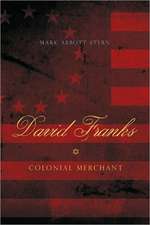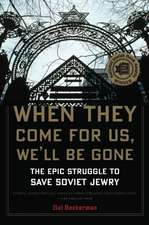Anti-Semitism and Schooling Under the Third Reich: Studies in the History of Education
Autor Gregory Wegneren Limba Engleză Paperback – 4 oct 2002
| Toate formatele și edițiile | Preț | Express |
|---|---|---|
| Paperback (1) | 405.95 lei 6-8 săpt. | |
| Taylor & Francis – 4 oct 2002 | 405.95 lei 6-8 săpt. | |
| Hardback (1) | 1439.09 lei 6-8 săpt. | |
| Taylor & Francis – 11 oct 2002 | 1439.09 lei 6-8 săpt. |
Preț: 405.95 lei
Nou
Puncte Express: 609
Preț estimativ în valută:
77.68€ • 81.10$ • 64.29£
77.68€ • 81.10$ • 64.29£
Carte tipărită la comandă
Livrare economică 05-19 aprilie
Preluare comenzi: 021 569.72.76
Specificații
ISBN-13: 9780815339434
ISBN-10: 0815339437
Pagini: 304
Ilustrații: 15 color images
Dimensiuni: 152 x 229 x 16 mm
Greutate: 0.53 kg
Ediția:1
Editura: Taylor & Francis
Colecția Routledge
Seria Studies in the History of Education
Locul publicării:Oxford, United Kingdom
ISBN-10: 0815339437
Pagini: 304
Ilustrații: 15 color images
Dimensiuni: 152 x 229 x 16 mm
Greutate: 0.53 kg
Ediția:1
Editura: Taylor & Francis
Colecția Routledge
Seria Studies in the History of Education
Locul publicării:Oxford, United Kingdom
Recenzii
"Within Hitler's Germany, education played a pivotal role in disseminating virulent Antisemitism among the German youth. It underscored Hitler's long-term objective of eliminating all forms of Jewish influence in European culture and furthered the public acceptance of events leading to the Holocaust. Within this difficult and complicated subject, Wegner offers readers an in-depth look at the ideology of National Socialism, its history, and its disturbing success, in influencing the course of German education during Hitler's twelve-year rule." -- David A. Meier, Professor of History, Dickinson State University
"Professor Wegner's study of the role played by anti-Semitism in the schools of the Third Reich fills a huge and long-neglected gap in the historiography of Nazi Germany. He portrays the frightening efficiency with which Nazi educators infused anti-Semitism into every aspect of the school curriculum -- racial hygiene, biology, history, geography, and literature. In today's parlance we might speak of "anti-Semitism across the curriculum." This study is firmly rooted in primary source material and becomes a major contribution to our understanding of how education can be misused to promote hatred and prejudice." -- Karl A. Schleunes, University of North Carolina at Greensboro
"Gregory Paul Wegner's study of the role played by anti-Semitism in the schools of the Third Reich fills a huge and long-neglected gap in the historiography of Nazi Germany. He portrays the frightening efficiency with which Nazi educators infused anti-Semitism into every aspect of the school curriculum. This study forms a major contribution to our understanding of how education can be misused to promote hatred and prejudice." -- Karl A. Schleunes, author of The Twisted Road to Auschwitz: Nazi Policy toward German Jews, 1933-1939
"By illuminating how education can become a tool for hate, Gregory Paul Wegner has done a great service not just for historians and educators, but for all concerned for the future of our society." -- Mark Weitzman, Director, Task Force Against Hate, Simon Wiesenthal Center
"Gregory Paul Wegner's extensive research and excellent analysis illuminates the linkages between educational thought and eugenicist ideology. He insightfully shows that curricular policy in the Third Reich was a bold attempt to rewrite history and religion, and that there was enthusiasm for the project from writers and educators." -- Stephen Feinstein, Director, Center for Holocaust and Genocide Studies, University of Minnesota
"Gregory Wegner has performed the valuable service of compiling and analyzing the publications and proposals of a distressingly large group of Nazi "education reformers" who ranged from the overtly vicious and genocidal to the self-proclaimed objective and dispassionate. Differing in tone and style, they agreed upon the goal of establishing "antisemitism across the curriculum." The disciplinary boundaries of biology, history, anthropology, literature, foreign languages, even physical education were to be transcended through the integrating theme of "race hygiene." -- Christopher R. Browning, Frank Porter Graham Professor of History, University of North Carolina at Chapel Hill
"Gregory Paul Wegner's study of the role played by anti-Semitism in the schools of the Third Reich fills a huge and long-neglected gap in the historiography of Nazi Germany. He portrays the frightening efficiency with which Nazi educators infused anti-Semitism into every aspect of the school curriculum. This study forms a major contribution to our understanding of how education can be misused to promote hatred and prejudice." -- Karl A. Schleunes, author of The Twisted Road to Auschwitz: Nazi Policy toward German Jews, 1933-1939
"By illuminating how education can become a tool for hate, Gregory Paul Wegner has done a great service not just for historians and educators, but for all concerned for the future of our society." -- Mark Weitzman, Director, Task Force Against Hate, Simon Wiesenthal Center
"Wegner's book is a useful addition to our understanding of education in the Third Reich." -- American Historical Review
"Professor Wegner's study of the role played by anti-Semitism in the schools of the Third Reich fills a huge and long-neglected gap in the historiography of Nazi Germany. He portrays the frightening efficiency with which Nazi educators infused anti-Semitism into every aspect of the school curriculum -- racial hygiene, biology, history, geography, and literature. In today's parlance we might speak of "anti-Semitism across the curriculum." This study is firmly rooted in primary source material and becomes a major contribution to our understanding of how education can be misused to promote hatred and prejudice." -- Karl A. Schleunes, University of North Carolina at Greensboro
"Gregory Paul Wegner's study of the role played by anti-Semitism in the schools of the Third Reich fills a huge and long-neglected gap in the historiography of Nazi Germany. He portrays the frightening efficiency with which Nazi educators infused anti-Semitism into every aspect of the school curriculum. This study forms a major contribution to our understanding of how education can be misused to promote hatred and prejudice." -- Karl A. Schleunes, author of The Twisted Road to Auschwitz: Nazi Policy toward German Jews, 1933-1939
"By illuminating how education can become a tool for hate, Gregory Paul Wegner has done a great service not just for historians and educators, but for all concerned for the future of our society." -- Mark Weitzman, Director, Task Force Against Hate, Simon Wiesenthal Center
"Gregory Paul Wegner's extensive research and excellent analysis illuminates the linkages between educational thought and eugenicist ideology. He insightfully shows that curricular policy in the Third Reich was a bold attempt to rewrite history and religion, and that there was enthusiasm for the project from writers and educators." -- Stephen Feinstein, Director, Center for Holocaust and Genocide Studies, University of Minnesota
"Gregory Wegner has performed the valuable service of compiling and analyzing the publications and proposals of a distressingly large group of Nazi "education reformers" who ranged from the overtly vicious and genocidal to the self-proclaimed objective and dispassionate. Differing in tone and style, they agreed upon the goal of establishing "antisemitism across the curriculum." The disciplinary boundaries of biology, history, anthropology, literature, foreign languages, even physical education were to be transcended through the integrating theme of "race hygiene." -- Christopher R. Browning, Frank Porter Graham Professor of History, University of North Carolina at Chapel Hill
"Gregory Paul Wegner's study of the role played by anti-Semitism in the schools of the Third Reich fills a huge and long-neglected gap in the historiography of Nazi Germany. He portrays the frightening efficiency with which Nazi educators infused anti-Semitism into every aspect of the school curriculum. This study forms a major contribution to our understanding of how education can be misused to promote hatred and prejudice." -- Karl A. Schleunes, author of The Twisted Road to Auschwitz: Nazi Policy toward German Jews, 1933-1939
"By illuminating how education can become a tool for hate, Gregory Paul Wegner has done a great service not just for historians and educators, but for all concerned for the future of our society." -- Mark Weitzman, Director, Task Force Against Hate, Simon Wiesenthal Center
"Wegner's book is a useful addition to our understanding of education in the Third Reich." -- American Historical Review
Notă biografică
Gregory Wegner is Professor of Foundations of Educational Policy at the University of Wisconsin, LaCrosse.
Cuprins
Acknowledgements Tables Illustrations Introduction 1. The Emergence of Racial Anti-Semitism and Nazi Educational Philosophy 2. The Jewish Question: Curriculum Perspectives from the Third Reich 3. The Jew as Racial Pariah in Race Hygiene and Biology 4. The Jew as Cultural Outsider in History and Geography 5. Exemplars of Anti-Semitic Literature for Children 6. Conclusion Glossary Bibliography Appendix Index
